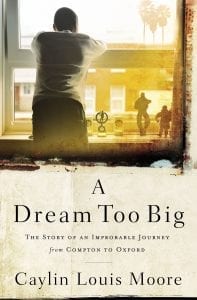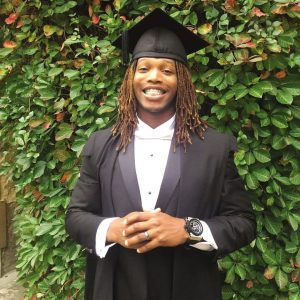Best Books
Caylin Louis Moore was a child of Compton, a city well-known for poverty, gangs, and crime. His single mother shared a bed with Moore and his two siblings. The plumbing was broken, rodents scampered behind the walls and hunger was a constant affliction. The sound of gunfire was a nightly event and gang violence was a perpetual threat. The schools were underfunded, jobs were scarce, and a spirit of despair saturated the city. Years later, Moore became a 2017 Rhodes Scholar, doing graduate studies at the University of Oxford, Jesus College.
 A Dream Too Big is the story of a remarkable young man’s rise from poverty and despair. Moore is a man of exceptional intelligence. He worked and studied hard, exercising intense self-discipline and dedication. But Moore’s story is not about how a child of Compton rose from the ashes on his own. Time and again, Moore’s climb from poverty was aided by men, women and institutions who offered not only inspiration, but also tangible assistance. The hands that reached out to him are varied. His mother, a woman of deep faith, taught him to respect himself and trust God. A sixth-grade teacher at his inner-city school took the time to point him in a new direction. The rapper Snoop Dog started the football league in which Moore excelled. A private, academically rigorous Jesuit high school offered him free tuition and a chance to play football. Colleges offered him assistance and a banker took time to mentor him. Moore did not climb out of Compton on his own.
A Dream Too Big is the story of a remarkable young man’s rise from poverty and despair. Moore is a man of exceptional intelligence. He worked and studied hard, exercising intense self-discipline and dedication. But Moore’s story is not about how a child of Compton rose from the ashes on his own. Time and again, Moore’s climb from poverty was aided by men, women and institutions who offered not only inspiration, but also tangible assistance. The hands that reached out to him are varied. His mother, a woman of deep faith, taught him to respect himself and trust God. A sixth-grade teacher at his inner-city school took the time to point him in a new direction. The rapper Snoop Dog started the football league in which Moore excelled. A private, academically rigorous Jesuit high school offered him free tuition and a chance to play football. Colleges offered him assistance and a banker took time to mentor him. Moore did not climb out of Compton on his own.
Alongside the people who directly impacted Moore is the cloud of witnesses which paved the way for his journey. Preachers and poets, athletes and activists, writers and rappers – these are the people which comprised the village of support for Moore. He was inspired by them. He was taught by them. He was supported by them. As he says in the final pages, “One must have boots in order to pull themselves up from their bootstraps.”

Moore knows that a concept of the gospel which is not concerned with advancing social justice, peace and the well-being of our communities is foreign to the New Testament. Jesus didn’t only preach a message of spiritual salvation. He also healed people. He gave them food. He identified himself with prisoners, the poor and the outcasts. Jesus knew what it was like to be hungry, unjustly oppressed, and to live in poverty. Jesus was, and still is, a Compton man.
–Darrel Holcombe, Owner
Sanctuary Christian Books and Gifts
Colonial Promenade, Alabaster
205-663-2370








